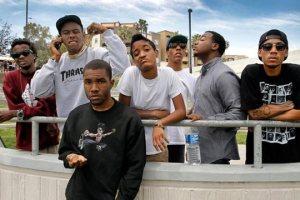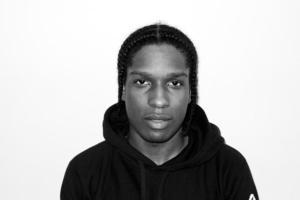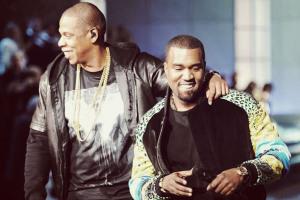I often find myself having to defend hip-hop and rap when I talk to people about my particular taste in music. As a genre, rap comes across as aggressive, homophobic, sexist, ignorant and repetitive – but that all depends on the artists you listen to and how you interpret the lyrics. We can’t just throw all genre-based artists into one box and denounce every artist inside the genre. One must also consider the meaning behind the lyrics. Are the artists being ironic? Why is there such an emphasis on consumer culture? Or, are rappers really just rappin’ about ass, titties, money and bitches?
Rap music can be all these things (aggressive, homophobic, sexist, ignorant and repetitive). However, in this post, I’m focussing on the artists out there who are trying to bridge the homophobic gap (the whole “rap & misogony” topic is a whole other can of worms that deserves it’s own blog post/essay/academic thesis).
When Tyler met Frank
I remember when I first heard Frank Ocean‘s smooth vocals on “No Church in the Wild” back in August 2011 when Kanye and Jay Z’s collaborative album Watched the Throne dropped. Months later I remember the first time I heard “She” by OFWGKTA’s frontman Tyler, the Creator featuring Frank Ocean, and I was so excited to see that Ocean was a member of the LA alternative rap collective – however, this is a group known for depicting violence, misogony and homophobia in their somewhat poetic lyrics.

Tyler, the Creator and Frank Ocean with OFWGKTA
A year later, Frank Ocean released his debut album Channel Orange, which was a critical and commercial success. Six days prior to the release of Channel Orange, Ocean came out as “gay/ bisexual” on his Tumblr. Following his announcement there was a media storm and everyone was asking the same question: “How has he been a part of OFWGKTA this whole time?” Tyler, the Creator and his collective are often recognised for their offensive and homophobic lyrics, probably because Tyler used the word “faggot” 231 times in his 2011 album Goblin.
“I’m not homophobic…I have gay fans and they don’t really take it offensive, so I don’t know. If it offends you, it offends you. If you call me a nigga, I really don’t care, but that’s just me, personally. Some people might take it the other way; I personally don’t give a shit,” - Tyler, the Creator.
When Frank Ocean came out to the public, Tyler tweeted:
“My Big Brother Finally Fucking Did That. Proud Of That Nigga Cause I Know That Shit Is Difficult Or Whatever. Anyway. Im A Toilet” - Tyler, the Creator: Human Toilet.
Macklemore & Ryan Lewis
These guys. THESE GUYS. Rapper Ben Haggerty (AKA Macklemore) and producer Ryan Lewis create music that is celebratory, sometimes humorous, and – in this particular case – very honest and moving.
Every time I watch this video (and don’t ask me how many times I’ve watched it), I cry. Tears come streaming down my cheeks. Macklemore’s honest lyrics drive the song to depths more complex than “gays should be allowed to marry” as he explores the subconscious, negative and homophobic messages in society that continue to be sent:
When I was in the 3rd grade / I thought that I was gay / Cause I could draw, my uncle was / And I kept my room straight / I told my mom, tears rushing down my face / She’s like, “Ben you’ve loved girls since before pre-K.
A pre-conceived idea of what it all meant / For those that like the same sex had the characteristics / The right-wing conservatives think its a decision / And you can be cured with some treatment and religion / Man-made, rewiring of a pre-disposition.
Macklemore’s message is delivered through his clear and coherant rap lyrics, especially when he focusses on rap and social-media:
If I was gay / I would think hip-hop hates me / Have you read the YouTube comments lately? / “Man that’s gay” gets dropped on the daily / We’ve become so numb to what we’re sayin’
Macklemore makes more of an effort than most rappers on this issue. He isn’t afraid to show that he really cares for the cause, without having to say “I don’t give a fuck what you do” to reassert his dominant male-rapper status.
Hip-hop, fashion, confusion and “not giving a fuck”
Hip-hop and consumer-culture are synonymous with one another. As consumer-culture values shift, the importance of style and fashion becomes more prominent in hip-hop and rap cultures (check your Facebook, do any/many of your friends like the page “Boss Hunting“? It is a prime example of the importance and shift in consumer culture).
Harlem rapper A$AP Rocky is a stylish guy who spent his teens between Harlem and SoHo, and he discusses how this affected his street cred and style in an interview.

Newcomer A$AP Rocky
“I kicked down the door for kids to wear Jeremy Scott sneakers and rips in their jeans and not feel gay, because that’s what society of the urban community tries to portray…different is gay, weird is gay” he concluded with “that shit ain’t gay, that shit is different,” - A$AP Rocky.
A$AP Rocky says “I used to be homophobic. But as I got older, I realised that wasn’t the way you do things. I don’t discriminate against anybody for their sexual preference or their skin colour because that’s immature…you don’t have to worry about what he’s doing. He’s gay and that’s his business…I don’t give a fuck about gay people, I don’t give a fuck about straight people”.
(Note: I’m noticing a trend in rappers for equality who “don’t give a fuck” about whether people are gay or straight… it’s a way for them to say “yeah, I support this cause” without giving up there their image.)
Producer/Mogul/Genius/Walking-controversy Kanye West weighed in on the discussion several years ago after people started to assume that his passion for fashion also implied he had a passion for men. However, he charismatically defended himself – and homosexuals – in an interview, saying “People are so gay-conscious now”.

The straight power-couple: Jay Z & Kanye West
Kanye made a reference to the common phrase (especially in rap and hip-hop) “no homo”. Rappers use the term “no homo” as a defence mechanism to ensure their audience that they (the rapper) are not gay. If a rapper says something that could come across as homoerotic or emasculating, they’ll add a quick “pause – no homo” to reinstate their masculinity as a straight, male rapper.
Kanye is also a fashion designer, which explains his love of style and the pride he takes in what he wears. He says in the interview “As straight men, we need to take the rainbow back because it looks fresh” in which he is referring to rainbows being the symbol of gay pride, he continues with “the idea of colours…how is that a gay thing!?” he also once said he was “inspired by gay people” and how they dressed, to which he expands on in the interview; “That’s when I was ignorant. Some gay people don’t dress good at all!”
Other rappers who publicly support gay-marriage include Jay-Z, Ice Cube, T.I., 50 Cent, and Kendrick Lamar, to name a few. Rapper ‘Lil B’s album was entitled, “I’m Gay” until he started receiving death threats and brought out an alternative title, “I’m Happy”.
The rap/hip-hop genre is a complex movement where rhymes and ideas will often contradict each other, where consumer culture and fashion dominate the lyrics, yet the whole “bitches, ass, titties” references balance out the passion for fashion in order for the artist to be recognised as a straight, manly, male.
Just because rap sounds aggressive, and just because it has discriminative overtones, doesn’t mean there aren’t people within the genre who are trying to bridge the gap between rap music and equality. Listen a little closer to the lyrics, I think you’ll find that some of the content is more profound than we are lead to believe.
“No freedom ’til we’re equal – damn right I support it.”

